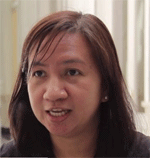Social Watch E-Newsletter - Issue 162 - March 28, 2014
Published on Fri, 2014-03-28 00:00
 |
| Issue 162 - March 28, 2014 |
|
|
|
| |
| |
|
| |
Monitoring and accountability: Voices of the "watchers"
|
| |
|
| |
The participants in the civil society strategy meeting on monitoring and accountability organized by Social Watch last february in Montevideo were asked about how they personally work and relate with the huge task of making the powerful accountable. Here is what they said:
|
| |
|
| |

Tanya Dawkins.
|
Tanya Dawkins
The focus of our work is putting people and communities at the center of the global economy and that is based on the recognition that global processes (like trade, finance, investment) have very local impacts.
See the video here.
|
| |
|
| |

Janet Carandang.
|
Janet Carandang
The focus of Social Watch Philippines is monitoring the social development commitments and financing for social development as the two complement each other and we also use the strategy for our budget initiative.
See the video here.
|
| |
|
| |
See all the videos here. More coming soon. |
| |
|
| |
After two weeks of intense negotiations, the 58th session of the Commission on the Status of Women ended early Saturday morning with a strong call to prioritize gender equality and the human rights of women in order to achieve sustainable development.
The Commission was convened at the UN headquarters in New York to address the challenges and achievements of the Millennium Development Goals (MDGs) in improving the lives of women and girls in developing countries. While the MDGs resulted in a reduction of poverty in some respects, the goals furthest from being achieved are those focused on women and girls—particularly on achieving gender equality and improving maternal health. With the MDGs set to expire in 2015, the Commission's outcome document will help shape priorities for the next global development framework. Read more
|
| |
|
| |
|
| |
 |
For the last quarter of the twentieth century, Latin America suffered from low growth, rising inequality, and frequent financial crises, i.e. currency, sovereign debt and banking crises. For instance, between the early 1980s and 2002 there were at least 26 major banking crises involving 15 countries. Sovereign debt defaults and currency crises were frequent, as were ‘double’ or ‘triple’ financial crises (as in the case of the Tequila crisis of 1994, Ecuadorian crisis of 1999, and Argentinean default of 2001-2). The cost of such crises was massive, as during the three years subsequent to their outbreak the cumulative output losses reached up to 98 per cent of GDP. During this period, the high income inequality that afflicted Latin America for centuries rose further – from a Gini of 48.9 in early 1980s to 54.1 in 2002 – including because of the impact of devastating financial crises on growth, employment, relative prices and public subsidies. Read more
|
|
|
| |
|
| Made possible thanks to the funding and support of Oxfam Novib and the Flemish North South Movement - 11.11.11. |
 |
| The contents of this publication are the sole responsibility of Social Watch and can in no way be taken to reflect the views of Oxfam Novib and the Coalition of the Flemish North South Movement - 11.11.11. |
|
|
|
|
